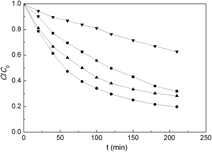Crossref Citations
This article has been cited by the following publications. This list is generated based on data provided by
Crossref.
Li, Wei
Li, Tingting
Liu, Ce
An, Libao
Li, Yuqing
Zhang, Weiwei
Liu, Lu
and
Zhang, Zhiming
2016.
Greatly enhanced photocatalytic activity and mechanism of H3PW12O40/polymethylmethacrylate/polycaprolactam sandwich nanofibrous membrane prepared by electrospinning.
Journal of Materials Research,
Vol. 31,
Issue. 19,
p.
3060.
Mesgari, Zohreh
and
Saien, Javad
2017.
Pollutant degradation over dye sensitized nitrogen doped titania substances in different configurations of visible light helical flow photoreactor.
Separation and Purification Technology,
Vol. 185,
Issue. ,
p.
129.
Song, Yiming
Li, Jun
and
Wang, Chen
2018.
Modification of porphyrin/dipyridine metal complexes on the surface of TiO2 nanotubes with enhanced photocatalytic activity for photoreduction of CO2 into methanol.
Journal of Materials Research,
Vol. 33,
Issue. 17,
p.
2612.
Liu, Shuilian
Chen, Jianlin
Xu, Difa
Zhang, Xiangchao
and
Shen, Mengyao
2018.
Enhanced photocatalytic activity of directZ-scheme Bi2O3/g-C3N4composites via facile one-step fabrication.
Journal of Materials Research,
Vol. 33,
Issue. 10,
p.
1391.
Yan, Xuehua
Yuan, Xiaoxue
Wang, Jinging
Wang, Qiong
Zhou, Chen
Wang, Dongfeng
Tang, Hua
Pan, Jianmei
and
Cheng, Xiaonong
2019.
Construction of novel ternary dual Z-scheme Ag3VO4/C3N4/reduced TiO2 composite with excellent visible-light photodegradation activity.
Journal of Materials Research,
Vol. 34,
Issue. 12,
p.
2024.
Ramírez-Aparicio, J.
Pathiranage, Taniya M. S. K.
Nguyen, Hien Q.
Stefan, Mihaela C.
Samaniego-Benítez, J. Enrique
Salinas-Bravo, V. M.
and
Ramírez-Bon, R.
2019.
Synthesis of P3HT base semiconducting hybrid films and their photocatalytic properties.
Journal of Coatings Technology and Research,
Vol. 16,
Issue. 4,
p.
1065.
Ding, Xiaodong
Wang, Wei
Zhang, Ao
Zhang, Lishan
and
Yu, Dan
2019.
Efficient visible light degradation of dyes in wastewater by nickel–phosphorus plating–titanium dioxide complex electroless plating fabric.
Journal of Materials Research,
Vol. 34,
Issue. 6,
p.
999.
Satapathy, P.
Pfuch, A.
Grunwald, R.
and
Das, S. K.
2020.
Enhancement of photocatalytic activity by femtosecond-laser induced periodic surface structures of Si.
Journal of Semiconductors,
Vol. 41,
Issue. 3,
p.
032303.
Nguyen, Thien-Phap
and
Le Rendu, Philippe
2022.
Innovations in Graphene-Based Polymer Composites.
p.
377.
Guo, Yefei
Fu, Xiaonan
Xie, Ying
Zhu, Lin
Liu, Ruijie
and
Liu, Lixin
2022.
Synthesis of Ag/ZnO nanocomposites with enhanced visible photocatalytic performance.
Optical Materials,
Vol. 133,
Issue. ,
p.
112980.
Guo, Yefei
Fu, xiaonan
Xie, Ying
Zhu, Lin
Liu, Ruijie
and
Liu, Lixin
2022.
Synthesis of Ag/Zno Nanocomposites with Enhanced Visible Photocatalytic Performance.
SSRN Electronic Journal ,
Pirashanthan, Arumugam
Kajana, Thirunavukarasu
Velauthapillai, Dhayalan
Shivatharsiny, Yohi
Bentouba, Said
and
Ravirajan, Punniamoorthy
2022.
Roles of Interfacial Modifiers in Inorganic Titania/Organic Poly(3-hexylthiophene) Heterojunction Hybrid Solar Cells.
Nanomaterials,
Vol. 12,
Issue. 5,
p.
820.
Guo, Yefei
Fu, xiaonan
Xie, Ying
Zhu, Lin
Liu, Ruijie
and
Liu, Lixin
2022.
Synthesis of Ag/Zno Nanocomposites with Enhanced Visible Photocatalytic Performance.
SSRN Electronic Journal ,
